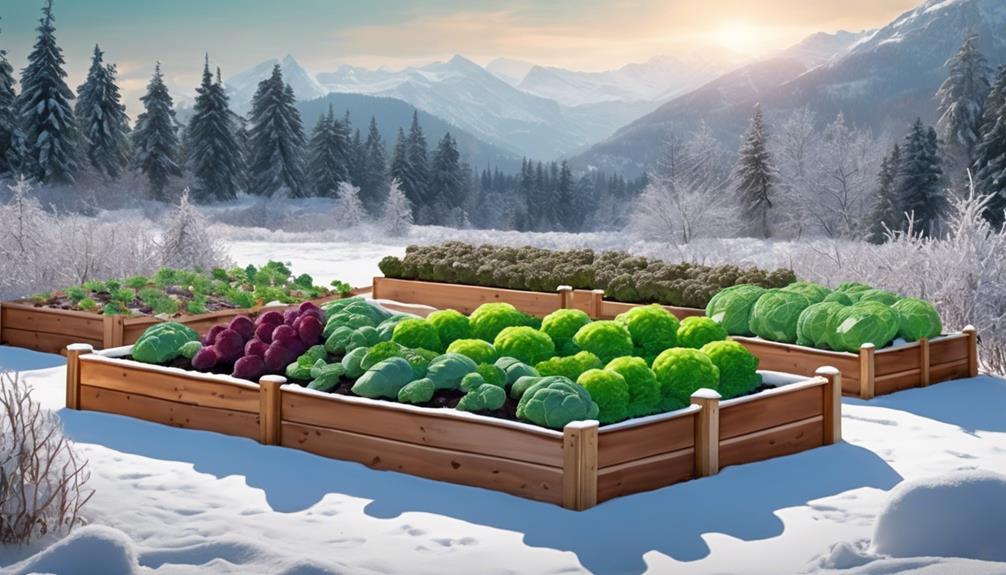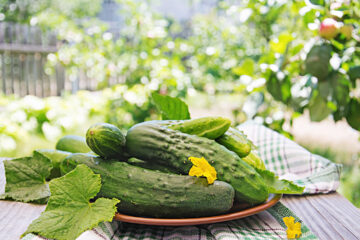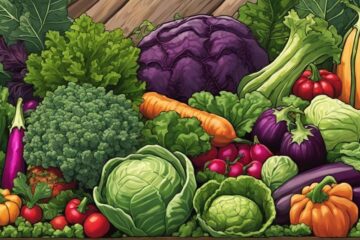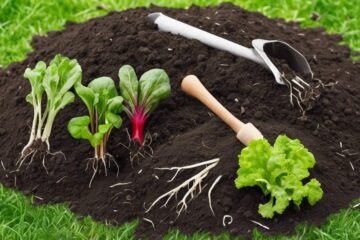When the temperatures drop and winter sets in, ensuring your winter vegetable garden thrives becomes crucial. By following five essential tips, you can set yourself up for a successful harvest.
From selecting the right vegetables to providing proper protection against the cold, each step plays a vital role in the productivity of your garden.
Stay tuned to discover these key strategies that will help you navigate the challenges of winter gardening with confidence.
Choosing the Right Winter Vegetables
To ensure a successful winter vegetable garden, choose cold-hardy vegetables that thrive in lower temperatures and can withstand frost. Winter gardening requires selecting vegetables like kale, Brussels sprouts, carrots, beets, turnips, radishes, spinach, lettuce, Swiss chard, broccoli, cauliflower, and cabbage.
These cold-hardy options are ideal for your vegetable growing endeavors during the colder months. By planting these varieties, you can continue growing fresh produce even when temperatures drop. Consider using cold frames to provide additional protection and create a more favorable environment for your winter crops.
Remember to avoid warm-season crops like tomatoes and peppers, as they may struggle to perform well in winter conditions. Focus on these resilient vegetables to ensure a bountiful winter harvest.
Providing Adequate Cold Protection
Consider using frost blankets, row covers, or cold frames to safeguard your winter vegetables from freezing temperatures. Here are some tips to help you provide adequate cold protection for your winter garden:
- Ensure proper coverage: Use frost cloth or similar coverings that offer at least 4°F of protection to shield your plants from the cold.
- DIY solutions: Create low poly tunnels using PVC and greenhouse poly to effectively retain warmth around your crops.
- Utilize cold frames: These structures provide a protective environment for winter vegetables, especially in colder regions.
- Extend the season: Floating row covers can help prolong the growing season for your winter vegetable garden, allowing you to enjoy fresh produce for longer.
Timing Your Winter Planting Schedule
Start planning your winter planting schedule now to ensure successful growth and a plentiful harvest of fresh vegetables in the colder months. Timing is crucial for a successful winter vegetable garden. By planting in late summer or early fall, your plants will have time to mature before the colder temperatures arrive, allowing them to establish well before winter sets in. Early planting also helps plants adapt to the upcoming cold conditions, increasing their chances of thriving during the winter season. Proper timing of your planting schedule is essential for maximizing the growth and yield of your winter vegetables. Follow the tips below to plan your successful winter planting schedule:
| Month | Vegetables to Plant | Notes |
|---|---|---|
| August | Broccoli, Carrots, Spinach | Start with cold-hardy varieties |
| September | Lettuce, Radishes, Peas | Sow seeds directly into the ground |
| October | Cabbage, Kale, Brussels Sprouts | Provide adequate mulching for warmth |
Implementing Proper Soil Preparation
Proper soil preparation is crucial for ensuring the success of your winter vegetable garden. To achieve optimal results in the cold season, follow these essential steps:
- Test the soil pH to ensure it's suitable for winter vegetable growth.
- Add organic matter like compost or aged manure to improve soil structure and nutrient content.
- Loosen compacted soil to help roots penetrate easily and access nutrients and water effectively.
- Clear debris and weeds from the soil surface to prevent competition for resources and reduce the risk of pests and diseases.
Maintaining Consistent Moisture Levels
To ensure your winter vegetable garden thrives, maintaining consistent moisture levels is essential for healthy plant growth and successful harvests. Winter vegetable plants need adequate watering to prevent stress from dry conditions and colder temperatures.
Mulching around your plants in small pieces can help retain moisture in the soil, reducing water loss through evaporation. Remember to water deeply but less frequently during the winter months to keep the soil moist without waterlogging it.
Monitoring the soil moisture levels regularly is a crucial part of winter gardening. By following these tips and tricks, you can ensure your plants continue growing well throughout the colder temperatures and achieve a bountiful harvest.
Frequently Asked Questions
What to Do to Vegetable Garden in Winter?
To care for your winter vegetable garden, choose cold-hardy veggies, start planting early, protect with covers, ensure light and water, harvest regularly, mulch soil, and rotate crops. These steps will help your garden thrive in colder months.
What Are the Top 5 Common Veggies That Can Be Planted During Winter?
Planting winter vegetables can fill your garden with life even in the cold. Kale, spinach, lettuce, broccoli, and carrots thrive in winter. They withstand the chill and reward you with fresh produce. Enjoy your winter garden!
What Is the Best Fertilizer for Winter Vegetables?
For winter vegetables, choose a balanced fertilizer high in potassium to boost root growth and cold tolerance. Organic options like compost or manure deliver essential nutrients without risking plant burn. Avoid excessive leaf growth with low nitrogen fertilizers.
What Temperature Is Too Cold for Vegetable Plants?
When it comes to your vegetable plants, remember that they shiver below 32°F. Frost-sensitive veggies like tomatoes can feel the chill under 50°F. Leafy greens and roots handle 20-25°F, but beware the icy grip below 20°F!
Conclusion
So, as you tend to your winter garden with care and attention, remember: just like a cozy blanket shields you from the cold, proper protection and nurturing will help your vegetables thrive in the winter chill.
With the right choices, timing, and maintenance, your garden will flourish like a vibrant winter wonderland, providing you with fresh, nutritious produce all season long.
Happy gardening!





